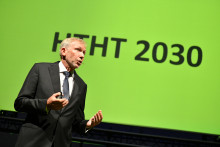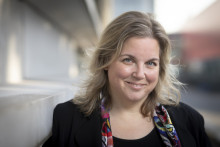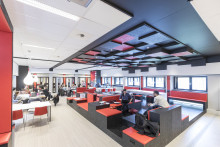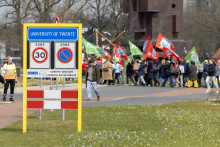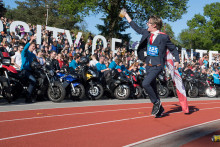‘Open your mind and cross that bridge,’ Victor van der Chijs kicked-off the ceremony. After words of welcome and commemorating members of the UT community who passed in the past year, Van der Chijs focused on the future. ‘Are we a future-proof university? We need to get ready for 2030. In order to do that, we’ll organize workshops and debates for all students, staff and other stakeholders at the UT, to help us create future strategy which for now we call “High Tech Human Touch 2030”. The world is changing and so should we.’
Launch of ‘the biggest energy transition ever’
In order to be at the forefront of the change, today’s event served as the occasion for launching what Van der Chijs called ‘a major initiative that will strongly influence the university and Twente’. He spoke of the new collaboration with company Lithium Werks. The company’s chairman is no other than Kees Koolen, UT alumnus and the former CEO of Booking.com. Lithium Werks plans to build a large clean energy research and development campus at Twente Airport, aiming to employ about 2,000 people working on energy transition. The University of Twente is to play a key role in this initiative.
Awards
A number of prizes were awarded at the Opening of the Academic Year.
- The TGS (Twente Graduate School) award went to Martijn Blom.
- Brigit Geveling became the winner of the Brinksma Innovation Grant for education innovation.
- The Education Award was handed to Farid Vahdati.
Connecting technology and humanity
This year’s keynote speaker was Annemieke Nijhof, CEO of Tauw, the international engineering consultants firm. Nijhof, who is a graduate of Chemical Engineering at the UT, shared her personal experiences of building bridges – especially between technological innovation and our human nature. ‘Technology is always embedded into other existing systems,’ she said. ‘Changing things through innovation is difficult. You need to fully respect the existing system and connect it to it, build a bridge between the new and the old.’
‘I’m very worried about the speed of climate change,’ continued the alumna who spent 14 years in the Dutch government working on sustainable challenges. ‘But I’m also very optimistic because I see the accelerated speed of technological innovation. We can still be in time to make the transition into a new energy system. However, this requires engineers who are more than just clever heads on legs. They need to be aware of the world around them and make their developments human.’
Nijhof warned that it’s not only up to engineers, but up to each and every one of us to make necessary changes. ‘It’s between you and you. You are lucky to be here surrounded by excellent teachers, getting great education. It doesn’t come for free. Ask yourselves: “Have I contributed everything I could to help save the world?”’ And Victor van der Chijs added: ‘It’s more than just technology, it’s about the mindset.’


